This page links to articles in science journals and news media about how we are “eating our future” – compromising our health and quality of life. And of how by making wiser food choices each of us can:
- Reduce the risk of developing crippling degenerative diseases.
- Reduce pollution & the production of climate-changing greenhouse gases.
- Reduce the loss of biodiversity, the destruction of ecosystems and the “sixth mass extinction”.
- Reduce other outcomes like poverty, famine and armed conflict over declining resources such as fresh water, fossil fuels and lands suitable for food production.
¬ ¬ ¬ ¬ ¬
Section 1: Regards Our Future Quality of Life related to Resources and Environment.
From the American Journal of Clinical Nutrition (AJCN), 2003, study titled “Sustainability of meat-based and plant-based diets and the environment”
- “The major threat to future survival and to U.S. natural resources is rapid population growth …
- The average fossil energy input for all the animal protein production systems studied… is more than 11 times greater than that for grain protein production …
- Producing 1 kg of animal protein requires about 100 times more water than producing 1 kg of grain protein …
- On rangeland for forage production, more than 200,000 liters of water are needed to produce 1 kg of beef …
- Producing 1 kg of fresh beef may require about 13 kg of grain and 30 kg of hay …
- The amount of grains fed to US livestock is sufficient to feed about 840 million people who follow a plant-based diet [that’s 2.6 times present population] …
- In the United States, more than 9 billion livestock are maintained to supply the animal protein consumed each year…
- The US livestock population consumes more than 7 times as much grain as is consumed directly by the entire American population …
- Each American consumes about twice the RDA for protein. Americans on average are eating too much protein and are consuming about 1000 kcal in excess per day per capita …
- Both the meat-based average American diet and the lacto-ovo-vegetarian (dairy and poultry/eggs) diet… are not sustainable in the long term based on heavy fossil energy requirements. However, the meat-based diet requires more energy, land, and water resources than the lacto-ovo-vegetarian diet. In this limited sense, the lacto-ovo-vegetarian diet is more sustainable than the average American meat-based diet.”
Source: American Journal of Clinical Nutrition, Vol. 78, No. 3, 660S-663S, September 2003; http://www.ajcn.org/content/78/3/660S.full
~ ~ ~
The Independent: “Study claims meat creates half of all greenhouse gases”
“Livestock causes far more climate damage than first thought, says a new report … In a paper published by a respected US thinktank, the Worldwatch Institute, two World Bank environmental advisers claim that instead of 18 per cent of global emissions being caused by meat, the true figure is 51 per cent.
They claim that United Nation’s figures have severely underestimated the greenhouse gases caused by tens of billions of cattle, sheep, pigs, poultry and other animals in three main areas: methane, land use and respiration.
Their findings – which are likely to prompt fierce debate among academics – come amid increasing calls from climate change experts for people to eat less meat.
In the 19-page report, Robert Goodland, a former lead environmental adviser to the World Bank, and Jeff Anhang, a current adviser, suggest that domesticated animals cause 32 billion tons of carbon dioxide equivalent (CO2e), more than the combined impact of industry and energy…”
Source: The Independent newspaper, UK, 2009: http://www.independent.co.uk/environment/climate-change/study-claims-meat-creates-half-of-all-greenhouse-gases-1812909.html
~ ~ ~
The Guardian: “U.N. urges global move to meat and dairy-free diet”
“United Nations urges global move to meat and dairy-free diet … A global shift towards a vegan diet is vital to save the world from hunger, fuel poverty and the worst impacts of climate change, a United Nations report said today… Western tastes for diets rich in meat and dairy products are unsustainable… Agriculture, particularly meat and dairy products, accounts for 70% of global freshwater consumption, 38% of the total land use …”
Source: The Guardian newspaper, 2010; http://www.guardian.co.uk/environment/2010/jun/02/un-report-meat-free-diet
~ ~ ~
~ ~ ~
Deforestation of the Amazon Rainforest – often referred to as “The Lungs of the Earth”
The World Bank’s publication “Causes of Deforestation of the Amazon Brazilian Rainforest” (2004) states: “Land-use data on Amazonia demonstrates that the main cause of deforestation in the region is cattle ranching…” (p.59) “Cattle ranching enterprises now occupy nearly 75 percent of the deforested areas of Amazonia…” (p.XVIII)
Access the the report via https://tinyurl.com/amazondeforest
and directly at http://www-wds.worldbank.org/servlet/WDSContentServer/WDSP/IB/2004/02/02/000090341_20040202130625/Rendered/PDF/277150PAPER0wbwp0no1022.pdf
The Guardian: “There’s a population crisis all right. But probably not the one you think…”

Excerpts: “While all eyes are on human numbers, it’s the rise in farm animals that is laying the planet waste…
If we want to reduce our impacts this century, the paper concludes, it is consumption we must address. Population growth is outpaced by the growth in our consumption of almost all resources. There is enough to meet everyone’s need, even in a world of 10 billion people. There is not enough to meet everyone’s greed, even in a world of 2 billion people.
So let’s turn to a population crisis over which we do have some influence. I’m talking about the growth in livestock numbers. Human numbers are rising at roughly 1.2% a year, while livestock numbers are rising at around 2.4% a year. By 2050 the world’s living systems will have to support about 120m tonnes of extra humans, and 400m tonnes of extra farm animals.
Raising these animals already uses three-quarters of the world’s agricultural land. A third of our cereal crops are used to feed livestock: this may rise to roughly half by 2050. More people will starve as a result, because the poor rely mainly on grain for their subsistence, and diverting it to livestock raises the price. And now the grain that farm animals consume is being supplemented by oil crops, particularly soya, for which the forests and savannahs of South America are being cleared at shocking rates.
This might seem counter-intuitive, but were we to eat soya rather than meat, the clearance of natural vegetation required to supply us with the same amount of protein would decline by 94%. Producing protein from chickens requires three times as much land as protein from soybeans. Pork needs nine times, beef 32 times.
A recent paper in the journal Science of the Total Environment suggests that our consumption of meat is likely to be “the leading cause of modern species extinctions”. Not only is livestock farming the major reason for habitat destruction and the killing of predators, but its waste products are overwhelming the world’s capacity to absorb them. Factory farms in the US generate 13 times as much sewage as the human population does.
Freshwater life is being wiped out across the world by farm manure. In England the system designed to protect us from the tide of slurry has comprehensively broken down. Dead zones now extend from many coasts, as farm sewage erases ocean life across thousands of square kilometres.
Livestock farming creates around 14% of the world’s greenhouse gas emissions: slightly more than the output of the world’s cars, lorries, buses, trains, ships and planes. If you eat soya, your emissions per unit of protein are 20 times lower than eating pork or chicken, and 150 times lower than eating beef.
So why is hardly anyone talking about the cow, pig, sheep and chicken in the room? Why are there no government campaigns to reduce the consumption of animal products, just as they sometimes discourage our excessive use of electricity?
It’s not as if eating less meat and dairy will harm us. If we did as our doctors advise, our environmental impacts would decline in step with heart disease, strokes, diabetes and cancer. British people eat, on average, slightly more than their bodyweight in meat every year, while Americans consume another 50%: wildly more, in both cases, than is good for us or the rest of life on Earth.
But while plenty in the rich world are happy to discuss the dangers of brown people reproducing, the other population crisis scarcely crosses the threshold of perception. Livestock numbers present a direct moral challenge, as in this case we have agency. Hence the pregnant silence.
~ ~ ~
International Business Times: “Cow Farts Have ‘Larger Greenhouse Gas Impact’ Than Previously Thought; Methane Pushes Climate Change.”
A new study of methane emissions finds that the U.S. is spewing 50 percent more methane, a greenhouse gas 21 times better at trapping heat than carbon dioxide, into the atmosphere than the Environmental Protection Agency previously assumed. Several factors contribute to the accumulation of methane gas in Earth’s atmosphere, such as the burning of fossil fuels and leaks from oil and gas refining and drilling, but one contender stands out above the rest as particularly repugnant: cow farts…
According to the new research, livestock’s noxious flatulence accounts for a large portion of the methane gas being released into the atmosphere. Researchers say cows are producing twice as much methane gas as scientists previously believed…
The EPA has also recognized the contribution cow farts are making to Earth’s greenhouse gases, stating earlier that globally, livestock are the “largest source of methane from human-related activities”…
Source: International Business Times, November 26 2013 – http://www.ibtimes.com/cow-farts-have-larger-greenhouse-gas-impact-previously-thought-methane-pushes-climate-change-1487502
~ ~ ~
From CNN: “Climate Change: Why Beef is the new SUV”

“The world is faced with the herculean task of trying to limit warming to 2 degrees C … the point at which climate change is expected to get especially dangerous, leading to mega-droughts, mass extinctions & a sea-level rise that could wipe low-lying countries off the map…
“Globally, 14.5% of all greenhouse gas pollution can be attributed to livestock, according to the U.N. Food & Agriculture Organization… a huge chunk of the livestock industry’s role – 65% – comes from raising beef & dairy cattle… About 70% of this planet’s agricultural land is used for livestock production… In the Amazon, cattle production accounts for an estimated 50% to 80% of all deforestation…
Beef is … a hopelessly selfish, American indulgence; a middle finger to the planet…
Would you stop eating beef to save the planet?…”
Source: CNN, Sep 29, 2015 – http://edition.cnn.com/2015/09/29/opinions/sutter-beef-suv-cliamte-two-degrees/
~ ~ ~
TIME: “Silence the Cows and Save the Planet”
“Flatulent cows are not a laughing matter… The emissions produced by nature’s woodwind section contain a nasty mix of many gasses, among them methane. Though carbon dioxide is the first gas that comes to mind when we think of greenhouse emissions, pound for pound, methane is more than 20 times more powerful in terms of its global warming potential. Methane doesn’t linger in the atmosphere quite as long as CO2, and it’s not produced industrially in anywhere near the same quantity, but it does its damage all the same — and livestock toots out a surprisingly large share of it.
According to one Danish study, the average cow produces enough methane per year to do the same greenhouse damage as four tons of CO2. The average car, by contrast, produces just 2.7 tons. Multiply that by the planet’s 1.5 billion cattle and buffalo and 1.8 billion smaller ruminants and you have the methane equivalent of two billion tons of CO2 per year…”
Source: TIME, March 30, 2011 – http://science.time.com/2011/03/30/silence-the-cows-and-save-the-planet/
~ ~ ~
The Independent: “Cow ’emissions’ more damaging to planet than CO2 from cars”
“Meet the world’s top destroyer of the environment. It is not the car, or the plane, or even George Bush: it is the cow.
A United Nations report has identified the world’s rapidly growing herds of cattle as the greatest threat to the climate, forests and wildlife. And they are blamed for a host of other environmental crimes, from acid rain to the introduction of alien species, from producing deserts to creating dead zones in the oceans, from poisoning rivers and drinking water to destroying coral reefs.
The 400-page report by the Food and Agricultural Organisation, entitled Livestock’s Long Shadow, also surveys the damage done by sheep, chickens, pigs and goats. But in almost every case, the world’s 1.5 billion cattle are most to blame. Livestock are responsible for 18 per cent of the greenhouse gases that cause global warming, more than cars, planes and all other forms of transport put together.
Burning fuel to produce fertiliser to grow feed, to produce meat and to transport it – and clearing vegetation for grazing – produces 9 per cent of all emissions of carbon dioxide, the most common greenhouse gas. And their wind and manure emit more than one third of emissions of another, methane, which warms the world 20 times faster than carbon dioxide.
Livestock also produces more than 100 other polluting gases, including more than two-thirds of the world’s emissions of ammonia, one of the main causes of acid rain.
Ranching, the report adds, is “the major driver of deforestation” worldwide, and overgrazing is turning a fifth of all pastures and ranges into desert.Cows also soak up vast amounts of water: it takes a staggering 990 litres of water to produce one litre of milk.
Wastes from feedlots and fertilisers used to grow their feed overnourish water, causing weeds to choke all other life. And the pesticides, antibiotics and hormones used to treat them get into drinking water and endanger human health.
The pollution washes down to the sea, killing coral reefs and creating “dead zones” devoid of life. One is up to 21,000sqkm, in the Gulf of Mexico, where much of the waste from US beef production is carried down the Mississippi.
The report concludes that, unless drastic changes are made, the massive damage done by livestock will more than double by 2050, as demand for meat increases.”
Source: Independent newspaper UK, Sunday 10 December 2006 – http://www.independent.co.uk/environment/climate-change/cow-emissions-more-damaging-to-planet-than-co2-from-cars-427843.html
~ ~ ~
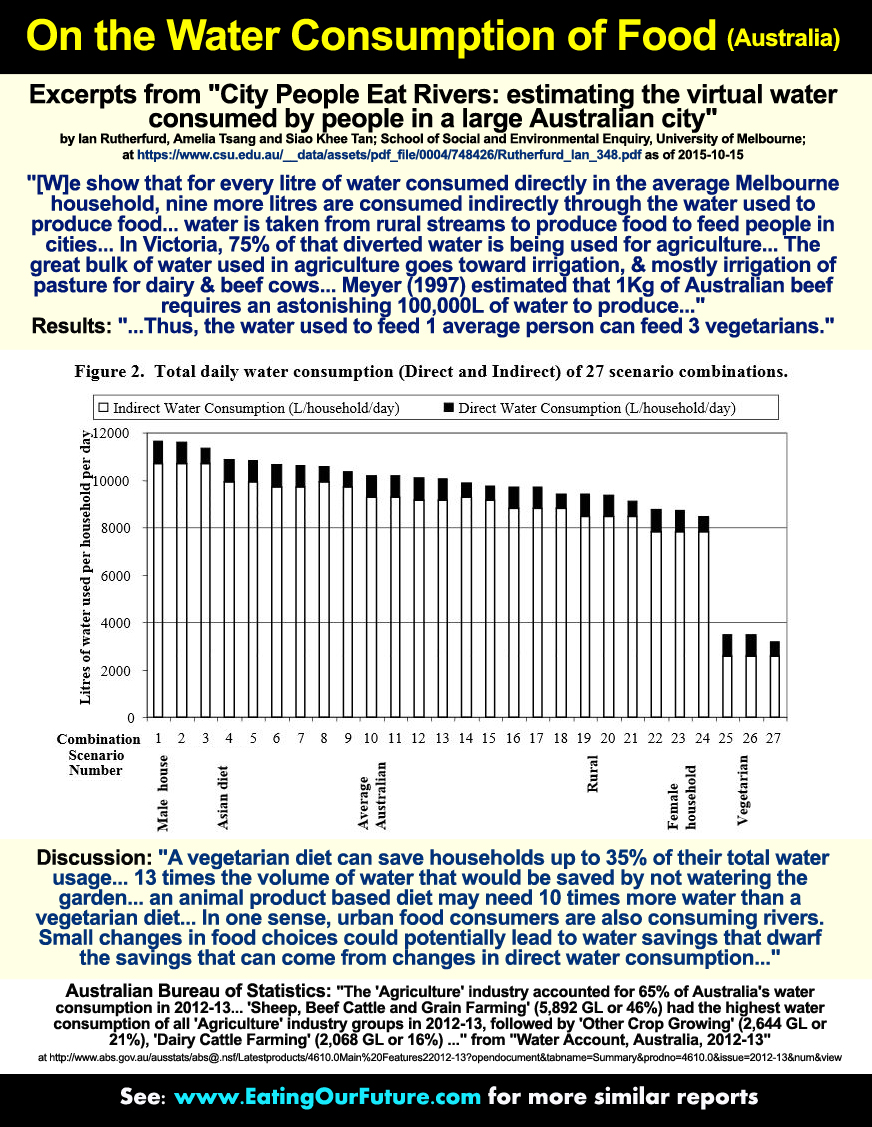
From the University of Melbourne, report titled: “City People Eat Rivers: estimating the virtual water consumed by people in a large Australian city.”
Excerpts: “In Australia, water is taken from rural streams to produce food to feed people in cities… In Victoria, 75% of that diverted water is being used for agriculture, and about 12% for urban domestic purposes. The great bulk of water used in agriculture goes toward irrigation, and mostly irrigation of pasture for dairy and beef cows…
Urban consumers very much drive the condition of rural streams through their food choices…
Meyer (1997) estimated that 1Kg of Australian beef requires an astonishing 100,000L of water to produce, and 1Kg of butter, requires 18,000L of water. The Water Education Foundation (1991) produced a water-use table for foods in a sample daily menu. Examples of water used in the menu were toast and butter (213L), chicken (435L), cheese (636L) and ground beef (312L)…
Indirect and direct water consumption:
The average Melbourne household directly uses 936 litres per day, whilst through food consumption; 9,276 litres per day per household. Thus, on average, water use through food consumption is 90% of a household’s water use. Regardless of how scenarios are combined, much more water is consumed through foods than through direct water use. The percentage of direct water use to total water use ranges from 6%, for an all male household with a garden (scenario 1), who consume 3,928 Litres per capita per day, to 26% for a vegetarian household with no garden (Scenario 27) who consume just 1,345 Litres per capita per day. Thus, the water used to feed one average person can feed three vegetarians…In gross terms, these results mean that changing one’s diets could save much more water than changing ones water-use behaviour in the home. For households that love meat, eating poultry instead of beef and pork will half their total water usage (from 3568L to 1603L per day). This is a saving of three times the total amount of water used directly in the home. Urban consumers can dramatically reduce their total water consumption with the following actions:
1. consume less food (and hence less water) by wasting less food (or by eating less food altogether!);
2. select comparable products that use less water;
3. substitute types of food that use more water for types that use less;
4. become a vegetarian…Select the more water-efficient product…
In the year 1998-99, each Australian consumed an aver age of 102 L of milk… choosing milk from the Murray irrigation area would consume 56,600 embodied litres of water per year, compared with 27,340 litres of water embodied in milk produced in Gippsland… This is a reduction in water use of nearly 30,000L per year or 80 L/day. Compare this with the 17 litres per day per person that has been saved in Melbourne under Stage 3 water restrictions between 2005 and 2006…Food substitution…
Consumers can ‘substitute’ entire groups of foods in their diet that use different amounts of water in their production. For example, in general, the greater the protein content of foods, the more water is used in their production per kg. However, by choosing soybeans and lentils instead of cheese, you would be eating roughly the same amounts of protein, but saving more than 2,000 litres of water per kilogram of food…Become a vegetarian:
A vegetarian diet can save households up to 35% of their total water usage. That is 13 times the volume of water that would be saved by not watering the garden. The environmental benefits of vegetarianism have been made for many years, and Renault (2003) suggests that an animal product based diet may need 10 times more water than a vegetarian diet. Certainly the water efficiency of vegetable production is startling…In one sense, urban food consumers are also consuming rivers. Small changes in food choices could potentially lead to water savings that dwarf the savings that can come from changes in direct water consumption. Thus, river condition is, to some extent, a consequence of decisions made in urban supermarkets.
We believe that this is an empowering observation. Urban people, far from being isolated from the environment, make critical decisions about rivers, every day, in their consumption choices…
Source: “City people eat rivers: estimating the virtual water consumed by people in a large Australian city” – by Ian Rutherfurd, Amelia Tsang and Siao Khee Tan; School of Social and Environmental Enquiry, University of Melbourne; at
https://www.csu.edu.au/__data/assets/pdf_file/0004/748426/Rutherfurd_Ian_348.pdf as of 2015-10-15
¬ ¬ ¬ ¬ ¬
Section 2: Regards Your Future Quality of Life Due to Health Considerations.
From the American Journal of Clinical Nutrition (AJCN):
“Diets largely based on plant foods, such as well-balanced vegetarian diets, could best prevent nutrient deficiencies as well as diet-related chronic diseases…
scores of nutritional epidemiologic studies have documented important and quantifiable benefits of vegetarian and other plant-based diets… Vegetarians living in affluent countries enjoy remarkably good health, exemplified by low rates of obesity, coronary diseases, diabetes, and many cancers, and increased longevity… meat intake has been related to increased risk for a variety of chronic diseases such as ischemic heart disease and some cancers… All the protective effects were observed for foods of plant origin, while all the hazardous effects were correlated with meat intake…”
Reference: “The contribution of vegetarian diets to health and disease: a paradigm shift?”, Joan Sabaté, Am J Clin Nutr, September 2003 vol.78 no.3 502S-507S; http://www.ajcn.org/content/78/3/502S.full
Another article in the AJCN states that: “long-term (≥ 2 decades) adherence to a vegetarian diet can further produce a significant 3.6-year increase in life expectancy…”
Reference: “Does low meat consumption increase life expectancy in humans?”, Pramil N Singh, Joan Sabaté, and Gary E Fraser, Am J Clin Nutr, September 2003 vol.78 no.3 526S-532S; http://ajcn.nutrition.org/content/78/3/526S.long
~ ~ ~ ~
Journal of the Academy of Nutrition & Dietetics:
“Abstract: It is the position of the American Dietitic Association and Dietitians of Canada that appropriately planned vegetarian diets are healthful, nutritionally adequate, and provide health benefits in the prevention and treatment of certain diseases…
Well-planned vegan and other types of vegetarian diets are appropriate for all stages of the life cycle, including during pregnancy, lactation, infancy, childhood, and adolescence. Vegetarian diets offer a number of nutritional benefits …
They state that vegetarians: “have lower body mass indices than non-vegetarians [ie. are less likely to be fat and obese compared to meat eaters]… have lower rates of death from ischemic heart disease… lower blood cholesterol levels; lower blood pressure; and lower rates of hypertension, type 2 diabetes, and prostate and colon cancer.”
Source: JADA, 2003, Vol.103 Issue 6, 748-765; http://www.andjrnl.org/article/S0002-8223%2803%2900294-3/fulltext
~ ~ ~ ~
From Critical Reviews in Food Science and Nutrition:
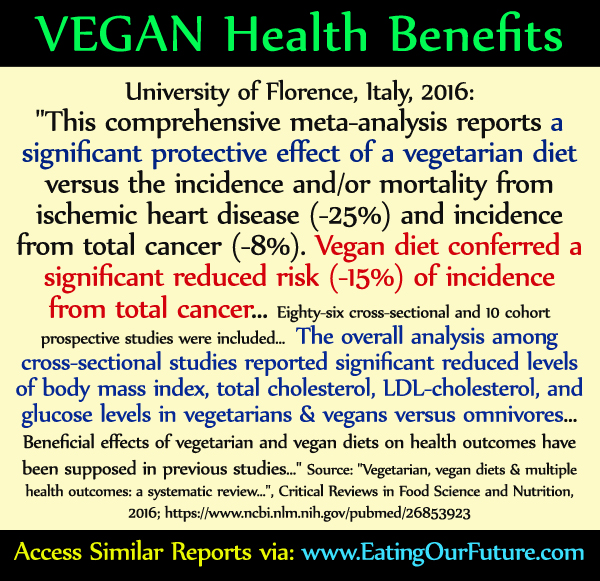
University of Florence, Italy, 2016:
“This comprehensive meta-analysis reports a significant protective effect of a vegetarian diet versus the incidence and/or mortality from ischemic heart disease (-25%) and incidence from total cancer (-8%). Vegan diet conferred a significant reduced risk (-15%) of incidence from total cancer… Eighty-six cross-sectional and 10 cohort prospective studies were included… The overall analysis among cross-sectional studies reported significant reduced levels of body mass index, total cholesterol, LDL-cholesterol, and glucose levels in vegetarians and vegans versus omnivores… Beneficial effects of vegetarian and vegan diets on health outcomes have been supposed in previous studies…”
Source: “Vegetarian, vegan diets & multiple health outcomes: a systematic review…”, Critical Reviews in Food Science and Nutrition, 2016;
https://www.ncbi.nlm.nih.gov/pubmed/26853923
~ ~ ~ ~
American Journal of Lifestyle Medicine, report titled: “Health Implications of a Vegetarian Diet”

“Abstract: There is now a significant amount of research that demonstrates the health benefits of vegetarian and plant-based diets, which have been associated with a reduced risk of obesity, diabetes, heart disease, and some types of cancer as well as increased longevity.
Vegetarian diets are typically lower in fat, particularly saturated fat, and higher in dietary fiber. They are also likely to include more whole grains, legumes, nuts, and soy protein, and together with the absence of red meat, this type of eating plan may provide many benefits for the prevention and treatment of obesity and chronic health problems, including diabetes and cardiovascular disease.
Although a well-planned vegetarian or vegan diet can meet all the nutritional needs of an individual, it may be necessary to pay particular attention to some nutrients to ensure an adequate intake, particularly if the person is on a vegan diet. This article will review the evidence for the health benefits of a vegetarian diet and also discuss strategies for meeting the nutritional needs of those following a vegetarian or plant-based eating pattern.”
Source: American Journal of Lifestyle Medicine May/June 2012 vol. 6 no. 3 250-267
http://ajl.sagepub.com/content/6/3/250.abstract Authors: Kate Marsh, BSc, MNutrDiet, PhD; Carol Zeuschner, BSc, MSc; Angela Saunders, BS, MA; Northside Nutrition and Dietetics, Chatswood, Australia.
~ ~ ~ ~
2014 Study title: “Beyond Meatless, the Health Effects of Vegan Diets…”
In regards to approximately 153,000 people.
Some excerpts:
“Vegetarian diets confer protection against cardiovascular diseases, cardiometabolic risk factors, some cancers and total mortality. Compared to lacto-ovo-vegetarian diets, vegan diets seem to offer additional protection for obesity, hypertension, type-2 diabetes, and cardiovascular mortality…”
“We summarized available evidence from three prospective cohorts of Adventists in North America: Adventist Mortality Study [22,940 participants], Adventist Health Study [34,198 participants], and Adventist Health Study-2 [96,000 participants]…”
Findings include:
“In all three cohorts, vegetarians experienced a 10% to 20% decreased in all-cause mortality…
Vegetarians experienced a modest, 8% risk reduction for overall-cancer. For cancer-specific sites, vegetarians had approximately half the risk of developing colon cancer. Also, vegetarians had 23% risk reduction for cancer of the gastrointestinal tract. Vegetarians experienced a 35% risk reduction for prostate cancer compared to non-vegetarians. Similarly, vegetarians tended to have lower risk for cancer of the respiratory tract and overall-cancer…
For BMI [Body Mass Index], vegetarians were approximately 2–4 points lower than non-vegetarians…
Lacto-ovo-vegetarians and vegans had respectively, 3 and 5 points lower BMI than non-vegetarians…
vegetarians had 55% lower odds of developing hypertension…
For hypertension, lacto-ovo-vegetarians experienced 55% lower risks; whereas, vegans had 75% risks reduction when compared to non-vegetarians…
The odds of developing type-2 diabetes was 25% to 49% lower for vegetarians compared to non-vegetarians in different cohorts…
Similarly, lacto-ovo-vegetarian and vegan were associated with lower risks of type-2 diabetes. The risks reduction of diabetes for lacto-ovo-vegetarians varied between 38% and 61%; and 47% to 78% for vegans…
The odds of developing metabolic syndrome (MetS) for vegetarians were about half compared to non-vegetarians…”
Reference: “Beyond Meatless, the Health Effects of Vegan Diets: Findings from the Adventist Cohorts”, Nutrients. 2014 Jun; 6(6): 2131–2147. Published online 2014 May 27. doi: 10.3390/nu6062131
– https://www.ncbi.nlm.nih.gov/pmc/articles/PMC4073139/
~ ~ ~ ~
American Journal of Clinical Nutrition (AJCN):
“Results associating diet with chronic disease in a cohort of 34192 California Seventh-day Adventists are summarized…
Multivariate analyses showed significant associations between beef consumption and fatal ischemic heart disease (IHD) in men…
significant protective associations between nut consumption and fatal and nonfatal IHD in both sexes…
and reduced risk of IHD in subjects preferring whole-grain to white bread.
The lifetime risk of IHD was reduced by ≈31% in those who consumed nuts frequently and by 37% in male vegetarians compared with nonvegetarians.
Cancers of the colon and prostate were significantly more likely in nonvegetarians [ie. cancer is more frequent in the meat eaters]…
and frequent beef consumers also had higher risk of bladder cancer.
Intake of legumes was negatively associated with risk of colon cancer in nonvegetarians and risk of pancreatic cancer.
Higher consumption of all fruit or dried fruit was associated with lower risks of lung, prostate, and pancreatic cancers.
Cross-sectional data suggest vegetarian Seventh-day Adventists have lower risks of diabetes mellitus, hypertension, and arthritis than nonvegetarians.
Thus, among Seventh-day Adventists, vegetarians are healthier than nonvegetarians but this cannot be ascribed only to the absence of meat.”
“Associations between diet and cancer, ischemic heart disease, and all-cause mortality in non-Hispanic white California Seventh-day Adventists”, American Journal of Clinical Nutrition, September 1999 vol. 70 no. 3 532s-538s
– http://ajcn.nutrition.org/content/70/3/532s
~ ~ ~
The Independent: “World Cancer Day: How meat can be murder. Warnings are now added to cigarettes, but what about meat consumption?”
Dr Neal Barnard: ‘Processed meat, bacon, sausage, ham and the like, is so strongly linked with bowel cancer – the 2nd largest cause of cancer death … that no one should ever eat it, according to a recent report by the World Cancer Research Fund & the American Institute for Cancer Research, based on a systematic review of more than 1,000 papers…
The World Health Organisation has determined that dietary factors account for at least 30 per cent of all cancer in Western countries and up to 20 per cent in developing countries …
Countries with a higher intake of fat, especially fat from animals, such as meat and dairy products, have a higher incidence of breast cancer. Analysis of data from almost 15,000 male physicians found that men who consumed red meat at least five times per week had a higher risk of developing prostate cancer than men who ate red meat less than once per week. Other studies have concluded that meat consumption may increase the risk of kidney and pancreatic cancer…’
Source: Independent Newspaper UK, 4th February 2013 – http://www.independent.co.uk/voices/comment/world-cancer-day-how-meat-can-be-murder-8478738.html
~ ~ ~ ~
Human Biology indicates what our Optimal Food Diet is. A Comparison of the Digestive Systems of Omnivores, Carnivores, Herbivores, Frugivores.
Click on the image above to open a larger easy-to-read version.
See this page for an article titled “Humans are naturally plant-eaters – according to the best evidence: our bodies” at http://michaelbluejay.com/veg/natural.html
= = = =
This set of articles were compiled for www.EatingOurFuture.com
= = = =
Pages on this Site:
Eating Meat & Dairy Increases Climate Change, Pollution & Damage to Our Environment
Quotes from news reports & science journals on how the Western omnivore diet with meat and dairy products accelerates climate-change through: i) increasing our carbon footprint of greenhouse gases; ii) deforesting & destroying wilderness that absorbs carbon and protects biodiversity; iii) creating massive pollution; and iv) wasting resources like grains, water, fuels and agricultural lands.
Scientific Studies on Health Advantages of Vegans & Vegetarians
Quotes & links to articles in science, medical & health journals that report great benefits vegetarians and vegans generally have including longer lives with less of the chronic degenerative diseases like cancer, cardiovascular heart disease, diabetes, osteoporosis and obesity as well as lower blood pressure, hypertension and blood cholesterol levels.
Eating Meat linked to Higher Rates & Risk of Cancer & Heart Disease
Excerpts & links to medical studies, articles & reports on the links between meat consumption and increased incidences of cancer, heart disease and shorter lifespan; also to reports on how cancers are increasing in young people.
Dairy Milk Health Problems – Issues & Risks for Related Disease & Illness
This page contains quotes & links for studies & articles in science journals, news media & by medical doctors; on the association of drinking milk to higher rates of osteoporosis, cancer, heart disease and other illnesses.
Eating Seafood & Overfishing is Destroying Oceans, Rivers & Wildlife
Excerpts from articles about the marine ecosystem collapse that is happening now in oceans, seas & rivers due to over-fishing and the toxic pollution in waterways from land-based animal agriculture meat-farming; worsening climate change; threatening the entire food chain; and articles from science journals that dispute the health claims made regards eating fish.
Are Soy Foods Healthy or Not? Doctors & Nutrition Experts Refute Some Myths
A collection of quotes & links for articles by doctors, dietitians & nutrition experts who refute & rebut the negative claims made regards “the soy food debate”
How We Are Eating Our Future
Excerpts from articles in science journals and news media about how what we choose to eat can: i) accelerate or slow down climate change and the related environmental catastrophes we face; and ii) increase or reduce our risks for chronic illness and disease. The evidence and body of opinion against the animal agriculture livestock industry is particularly compelling and damning.
= = = =
Below – Some More Memes
~ ~ ~ ~ ~ ~
A reply-rebuttal to this image meme that wrongly compares vegetarian Gillian McKeith to omnivore Nigella Lawson; highlighting what is wrong with this comparison.
~ ~ ~ ~ ~ ~
Another version – response to the picture meme comparing Gillian McKeith with Nigella Lawson – click to open a much larger view.
~ ~ ~ ~ ~ ~
Click the below image to open a larger clearer version in a new window
~ ~ ~ ~ ~ ~

~ ~ ~ ~ ~ ~
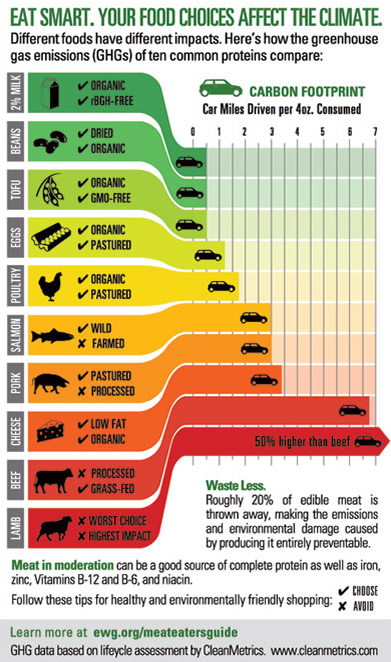
~ ~ ~ ~ ~





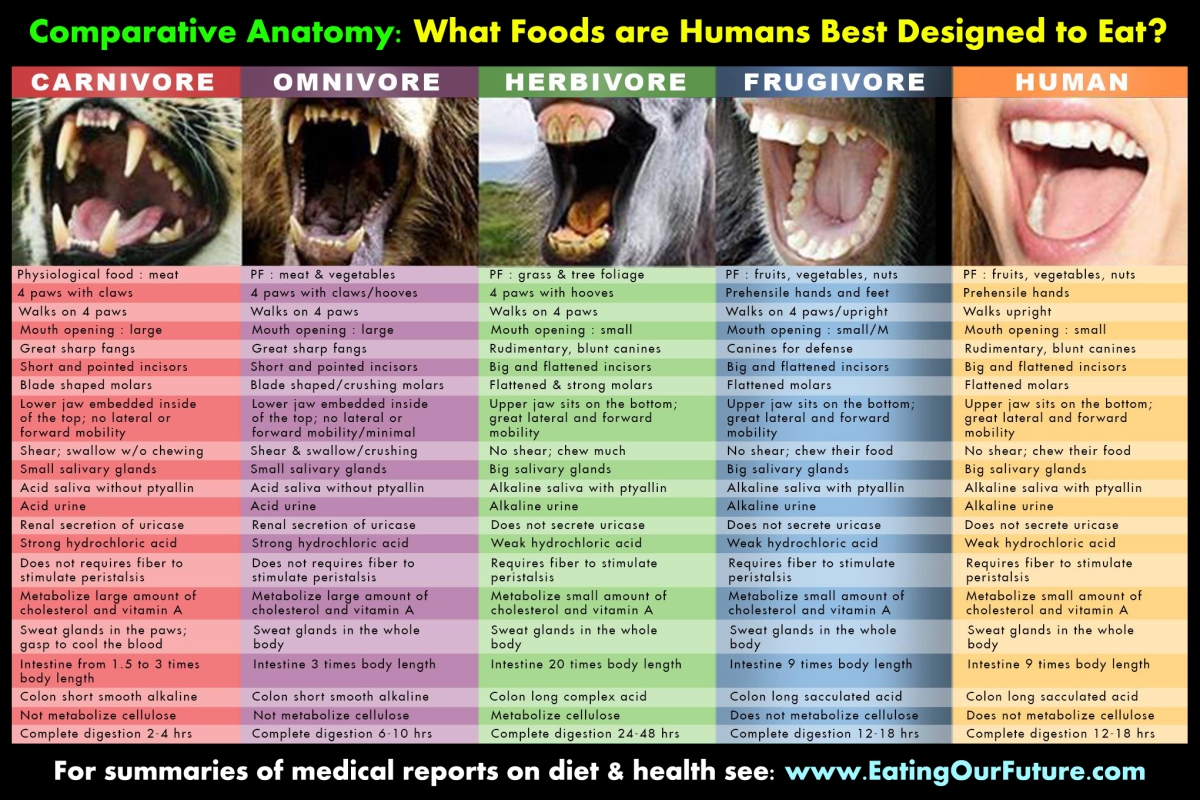

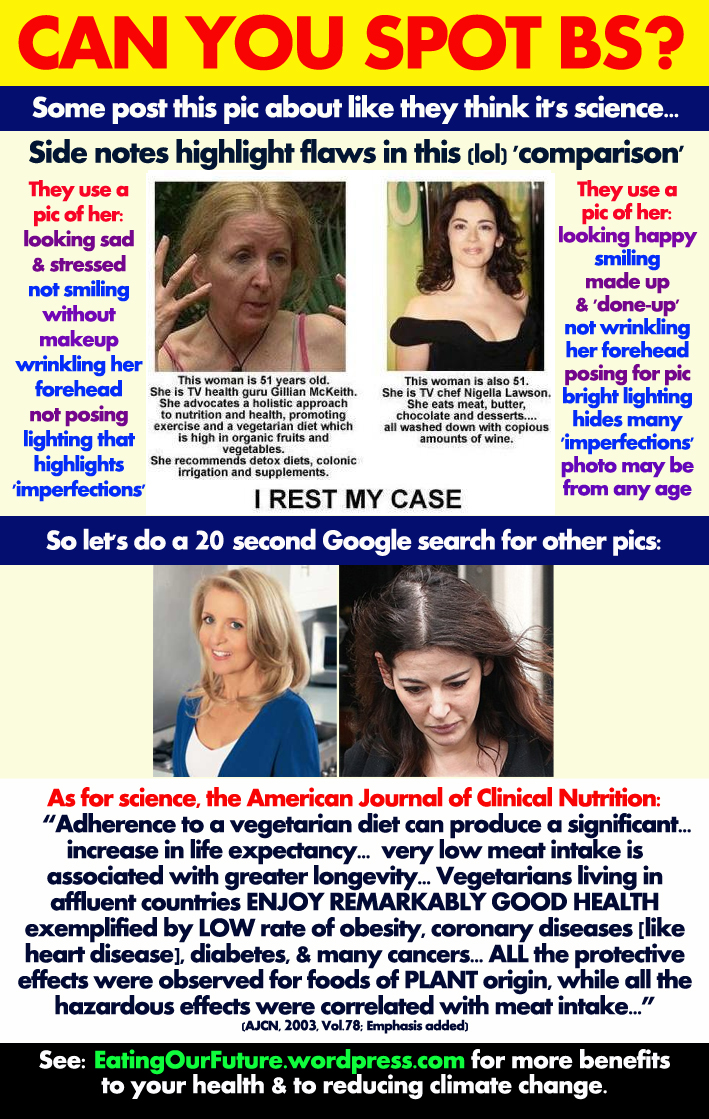
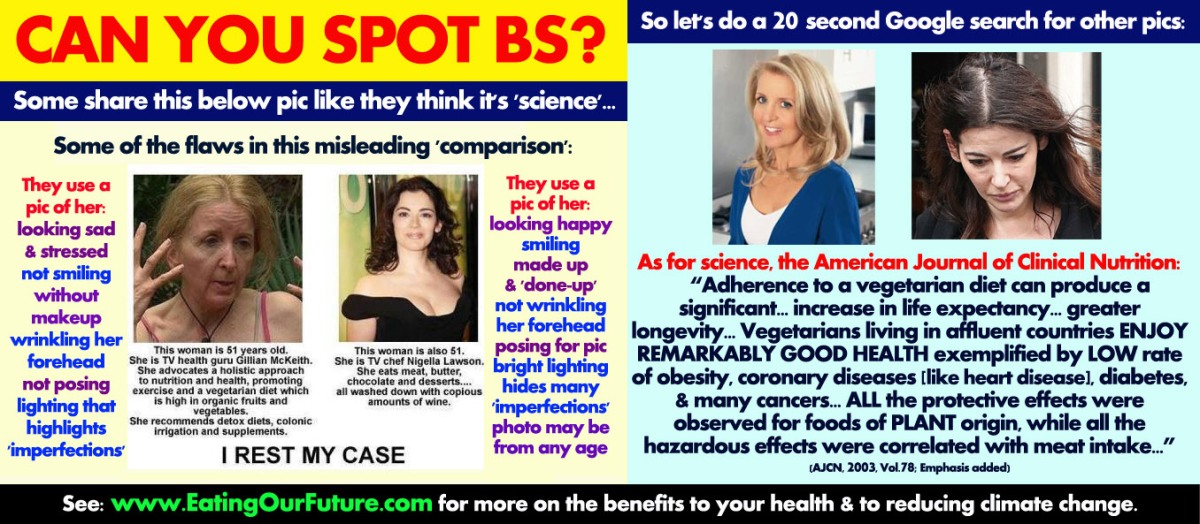


You must be logged in to post a comment.